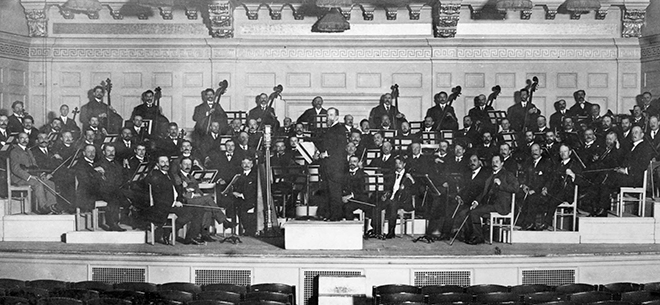
As the Hub’s venerable and acclaimed Boston Symphony Orchestra prepares for the debut of its 135th season on September 24, it’s almost hard to believe that this acclaimed institution had such humble beginnings. The dream of Civil War veteran, businessman and philanthropist Henry Lee Higginson, who desired to have a symphony in his hometown after being inspired 25 years prior by orchestral performances he attended as a young man in Vienna, the BSO first performed in 1881 under the direction of German-born conductor George Henschel. The orchestra held 20 concerts that first season, employed only local musicians to avoid friction with Boston’s music community and used the Boston Music Hall—which later became the still-existing Orpheum Theatre—as its home. Tickets cost a mere 25 or 75 cents apiece.
Higginson’s preference for German classical music led to a string of German- and Austrian-trained music directors in the early days. During this era, the beloved Boston Pops—an offshoot of the BSO that plays light classical and popular music—was created in 1885, and the acoustically superior Symphony Hall, the BSO’s current home, made its debut in 1900. The orchestra’s German influence was unceremoniously interrupted during World War I when Higginson and his orchestra manager Charles A. Ellis stubbornly refused to add “The Star Spangled Banner” to a performance in Providence, R.I., despite an upswell of patriotic sentiment in the country. Conductor Karl Muck, who was a Swiss citizen born in Germany that had ties to Kaiser Wilhelm, was eventually arrested and sent to an internment camp for the remainder of the war, after which he was deported. It was also during this period that Higginson, who had been the organization’s sole benefactor, began to cede control to a board of trustees. A brief period of French conductors followed, which influenced the sound of the BSO for years to come.
Despite a few years of disorganization and rebuilding, it wasn’t long before the BSO entered the period of its greatest prominence. Russian-born conductor Serge Koussevitzky, who was hired in 1924, oversaw the first orchestra concert for live radio broadcast in 1926, gaining the BSO exposure throughout the country. Koussevitzky and the BSO became less tradition-bound and turned more and more towards contemporary music, debuting pieces by such famed composers as Maurice Ravel, Sergei Prokofiev, George Gershwin and Igor Stravinsky. Tanglewood, the BSO’s annual summer home in the Berkshires of western Massachusetts, was inaugurated under Koussevitzky’s tenure. It was here that the conductor became a great teacher to future generations of musicians, including protégé and Lawrence, Mass.-native Leonard Bernstein, who was recommended by Koussevitzky as his replacement when the music director retired in 1949, but was passed over for a more experienced, European-trained conductor.
Regardless of this brush with greatness, the BSO’s sterling reputation continued under Alsatian maestro Charles Munch, who took the BSO on its first overseas tours. Also under Munch, in 1956, the BSO became the first American orchestra to perform in the former Soviet Union. The BSO’s string of European-born musical leaders, however, was finally broken in 1973 with the hiring of Seiji Ozawa. Born in China to Japanese parents, Ozawa holds the record for longest tenure at the helm of the BSO at 29 years. James Levine, who succeeded Ozawa in 2004, became the first U.S.-born conductor of the orchestra.
Today, under the direction of Latvian conductor Andris Nelsons, the Boston Symphony Orchestra remains one of the best classical ensembles in the country. Classical music lovers can join them at Symphony Hall for opening night of the 2016–2017 season, which features an all-Russian program of Shostakovich, Prokofiev and Mussorgsky and boasts internationally acclaimed pianist Lang Lang as a guest performer.


